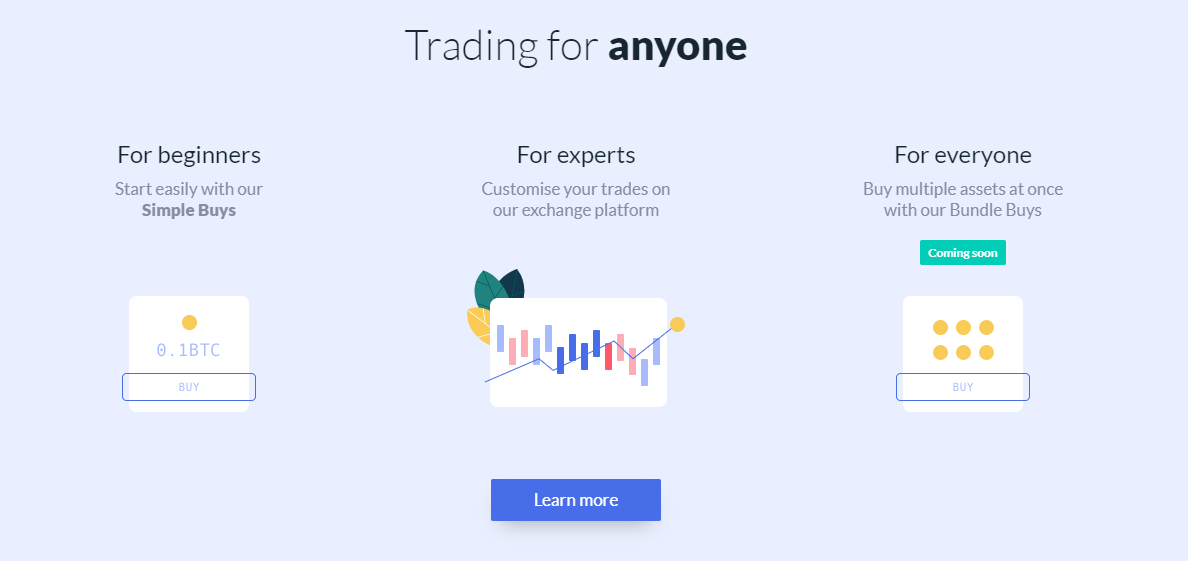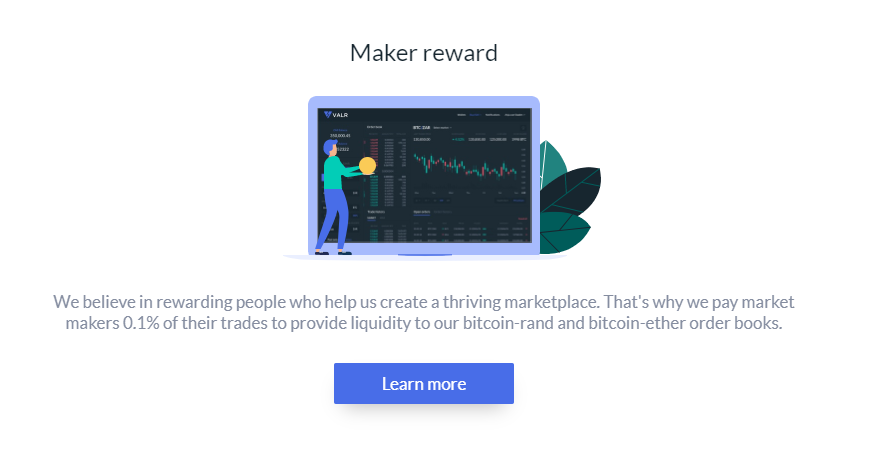
VALR

Börsen-Gebühren
Einzahlungsmethoden
Unterstützte Krypto-Währungen (57)
VALR Review
What is VALR?
VALR is a cryptocurrency exchange registered in South Africa. It has been active since March 2019. According to information provided to its users on 29 December 2020, it is now actually even "one of the largest trading platforms in South Africa" and has almost 100,000 users.
It markets itself as an exchange for "anyone", meaning that it doesn't matter if you are an experienced trader or a newbie. Newbies will have easily understandable purchaser interfaces to resort to, and the more advanced tools that some pro traders require are also available here.

VALR Mobile Support
Most crypto traders feel that desktop give the best conditions for their trading. The computer has a bigger screen, and on bigger screens, more of the crucial information that most traders base their trading decisions on can be viewed at the same time. The trading chart will also be easier to display. However, not all crypto investors require desktops for their trading. Some prefer to do their crypto trading via their mobile phone. If you are one of those traders, you’ll be happy to learn that VALR’s trading platform is also mobile compatible. You can download it to/from both the AppStore and Google Play:

VALR Trading View
Every trading platform has a trading view. The trading view is the part of the exchange’s website where you can see the price chart of a certain cryptocurrency and what its current price is. There are normally also buy and sell boxes, where you can place orders with respect to the relevant crypto, and, at most platforms, you will also be able to see the order history (i.e., previous transactions involving the relevant crypto). Everything in the same view on your desktop. There are of course also variations to what we have now described. This is the trading view at VALR:

It is up to you – and only you – to decide if the above trading view is suitable to you. Finally, there are usually many different ways in which you can change the settings to tailor the trading view after your very own preferences.
US-investors
Why do so many exchanges not allow US citizens to open accounts with them? The answer has only three letters. S, E and C (the Securities Exchange Commission). The reason the SEC is so scary is because the US does not allow foreign companies to solicit US investors, unless those foreign companies are also registered in the US (with the SEC). If foreign companies solicit US investors anyway, the SEC can sue them. There are many examples of when the SEC has sued crypto exchanges, one of which being when they sued EtherDelta for operating an unregistered exchange. Another example was when they sued Bitfinex and claimed that the stablecoin Tether (USDT) was misleading investors. It is very likely that more cases will follow.
VALR does not allow US-investors on its exchange. So if you’re from the US and would like to engage in crypto trading, you will have to look elsewhere. Luckily for you, if you go to the Exchange List and use our Exchange Filters, you can sort the exchanges based on whether or not they accept US-investors.
VALR Fees
VALR Trading fees
Every time you place an order, the exchange charges you a trading fee. The trading fee is normally a percentage of the value of the trade order. At this exchange, they divide between takers and makers. Takers are the one who “take” an existing order from the order book. Makers are the ones who add orders to the order book, thereby making liquidity at the platform.
At VALR, takers pay 0.10% of the order value in trading fees. 0.10% is below the global industry averages for centralized exchanges. Industry averages have historically been around 0.20-0.25% but we now see new industry averages emerging around 0.10%-0.15%. According to the latest empirical study on the subject, the industry average taker fees were 0.217% and the industry average maker fees were 0.164% (for spot trading). But what about the maker fees? Well, VALR actually offers so called negative maker fees (-0.01%). This means that the makers, i.e. the people creating the new buy or sell orders in the order book, get paid to trade.
For example: you are a maker. You create an sell order for Bitcoin, where you sell a certain amount of Bitcoin for USD 10,000. A buyer comes along and accepts your order. You were then the maker in this trade (the buyer was the taker). If the maker fee was -0.01%, as it is at VALR, you would not only get USD 10,000, you would also receive an additional USD 1.00 on top of that.

There aren’t that many exchanges that offer negative maker fees. To see them all and compare them against each other, just check out our Exchange List.
VALR Withdrawal fees
According to information we have received from the exchange, VALR does not charge any fees of their own when you withdraw crypto from your account at the platform. Accordingly, the only fee you have to think about when withdrawing are the network fees. The network fees are fees paid to the miners of the relevant crypto/blockchain, and not fees paid to the exchange itself. Network fees vary from day to day depending on the network pressure. In general though, only paying the network fees should be considered as below global industry average when it comes to fee levels for crypto withdrawals.
Deposit Methods
In addition to depositing cryptocurrency to the platform, VALR also lets you deposit fiat currency. Until mid-May 2022, they only supported wire transfers (not credit or debit cards). In May 2022, the exchange announced that it will also support deposits in South African Rand (ZAR) made through credit/debit cards issued in South Africa.

Seeing as fiat currency deposits are possible at this trading platform, this platform qualifies as an “entry-level exchange”, making it an exchange where new crypto investors can start their journey into the exciting crypto world.
Security
The following features are worth mentioning with respect to this exchange's security and compliance: secure custody, layered security and top-level regulatory compliance.

